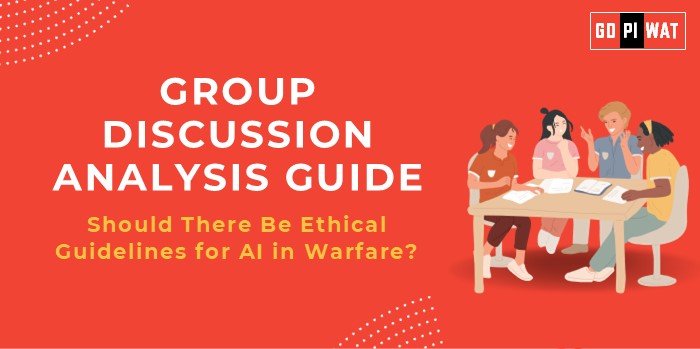📋 Group Discussion Analysis Guide: Should There Be Ethical Guidelines for AI in Warfare?
🌐 Introduction
The integration of artificial intelligence (AI) into military strategies is transforming global defense systems, but it has sparked significant ethical and humanitarian debates. As AI-driven systems like autonomous weapons become more prevalent, the demand for ethical frameworks grows to ensure responsible usage.
📊 Quick Facts & Key Statistics
- 💰 AI Defense Market: Valued at $7.45 billion in 2022, projected to grow at a 12.8% CAGR from 2023 to 2030, highlighting rapid militarization of AI.
- ⚙️ Autonomous Weapons (AWS): These systems operate without human intervention, raising ethical concerns about compliance with humanitarian laws.
- ⚠️ Civilian Impact: AI-powered weapons risk unintended civilian casualties due to the lack of nuanced judgment.
- 📜 Ethical Guidelines: The U.S. Department of Defense emphasizes principles like responsibility and equitability to guide AI’s military applications.
- 🌍 International Advocacy: A 2023 UN resolution supporting discussions on lethal autonomous weapons received 152 votes in favor, indicating global regulatory momentum.
🤝 Stakeholders and Their Roles
- Governments: Formulate ethical guidelines and fund AI defense research.
- International Organizations: Advocate for treaties and monitor compliance.
- Tech Companies: Develop AI responsibly while adhering to ethical principles.
- Civil Society: Push for transparency and accountability.
- Military Forces: Implement AI systems responsibly, adhering to established laws.
🏆 Achievements and Challenges
Achievements:
- 🚀 Enhanced Military Efficiency: AI optimizes decision-making and reduces human deployment in high-risk zones.
- 🛡️ Ethical Frameworks in Action: The U.S. Department of Defense has established principles for responsible AI use.
- 🤝 Global Collaboration: UN initiatives indicate growing consensus on regulating AI in warfare.
Challenges:
- ⚖️ Accountability Issues: Autonomous systems blur lines of legal responsibility.
- ⚠️ Humanitarian Risks: AWS may fail to distinguish between combatants and non-combatants.
- 📉 Regulatory Gaps: International consensus on enforcement remains limited.
Global Comparisons:
- 🇺🇸 Success: Countries like the U.S. have implemented ethical AI principles.
- 🌍 Challenges: Lack of uniformity in ethical guidelines across nations.
🗣️ Effective Discussion Approaches
- Opening Approaches:
- 📊 Statistics-Based: “The global AI military market is projected to grow at a CAGR of 12.8% from 2023 to 2030, underscoring its rapid adoption.”
- 📜 Case Study: Discuss the UN’s 2023 resolution on lethal autonomous weapons.
- ⚖️ Ethical Perspective: “Autonomous weapons pose risks to civilian safety and humanitarian law compliance.”
- Counter-Argument Handling:
- Highlight ethical principles like responsibility and traceability.
- Reference UN advocacy as a step toward global regulation.
⚙️ Strategic Analysis of Strengths & Weaknesses
- ✨ Strengths:
- Enhanced decision-making and precision in combat.
- Ethical frameworks like those by the U.S. Department of Defense.
- ⚠️ Weaknesses:
- Risks of civilian casualties and ethical violations.
- Uneven global regulation of autonomous systems.
- 💡 Opportunities:
- International treaties for uniform guidelines.
- Collaboration between governments and tech companies.
- ⚡ Threats:
- Escalation of AI arms races.
- Misuse by non-state actors.
💬 Structured Arguments for Discussion
- Supporting Stance: “Ethical guidelines can ensure compliance with humanitarian laws and reduce misuse risks.”
- Opposing Stance: “Excessive regulation may stifle innovation and compromise national defense.”
- Balanced Perspective: “Ethical principles must balance innovation with humanitarian obligations.”
📚 Connecting with B-School Applications
- Real-World Applications:
- Ethical leadership in technology-driven decision-making.
- Public-private partnerships for responsible innovation.
- Sample Interview Questions:
- 🤔 “Should ethics limit technological advancements in defense?”
- 🌍 “How can businesses contribute to ethical AI in warfare?”
- Insights for Students:
- 🔍 Explore frameworks for ethical technology integration.
- 🤝 Study international collaboration models for governance.


